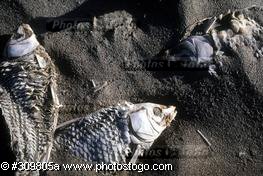|

Widespread
Water Violations Decried
By Eric Pianin
Washington Post Staff Writer
Wednesday, August 7, 2002; Page A7
Nearly one-third of major industrial facilities and government-operated sewage treatment plants
have significantly violated pollution discharge regulations during the past two years, but relatively few are being prosecuted,
according to a study by a watchdog group.
The report found that 10 states Texas, Ohio, New York, Indiana, Tennessee, North Carolina,
Alabama, Louisiana, Michigan and Pennsylvania had the largest number of major facilities in "significant noncompliance" with
discharge requirements during the 15-month period examined. In Texas alone, more than half the 546 major facilities and plants
violated the law at least once during that period, the study noted.
The U.S. Public Interest Research Group (PIRG) charged in the report that a combination of
lax enforcement of the Clean Water Act by the Environmental Protection Agency (EPA) and by state inspectors and lenient courts
have fostered persistently high levels of illegal dumping of waste and toxic chemicals. Many of these plants are far exceeding
their legal limits for polluting rivers and streams with little concern for being prosecuted, the study said.
"At the most basic level, the government . . . has failed to properly pursue and punish polluters,"
the report said. "Meanwhile, the courts have eroded citizens' ability to file suits in order to enforce the Clean Water Act."
The report is the latest in a series of sharp critiques of government enforcement policies
by environmental activists and government watchdogs. Prosecutions of environmental crimes fell sharply during the Clinton
administration, according to the study, and continued to decline as Bush administration officials sought to shift enforcement
resources from EPA headquarters and regional offices to the states.

According to the report, the number of pollution cases referred by the EPA for criminal prosecution
declined by 53 percent last year a figure the agency disputes while one out of every four facilities surveyed was operating
on an expired pollution permit. The Washington Post reported last month that the administration is considering a plan to reduce
federal oversight of a key Clean Water Act anti-pollution program and instead "trust states" to clean up more than 20,000
dirty rivers, lakes and estuaries.
"With widespread violations of the law, this is no time for the Bush administration to take
cops off the beat," Richard Caplan, the U.S. PIRG environmental advocate, said yesterday.
Joe Martyak, an EPA spokesman, said that recent agency clean water cases "reflect a strong
and vigorous enforcement effort for achieving compliance and deterring noncompliance."
He cited as examples cases in which the city of Baltimore was fined $600,000 for combined sewer
overflow and Wal-Mart Stores Inc. was penalized $1 million and ordered to make $4.5 million worth of improvements.
The Clean Water Act was approved by Congress in 1972 with the expressed goal of returning all
waters to fishable and swimmable conditions by 1983 and eliminating the discharge of all pollutants by 1985. Yet an estimated
40 percent of U.S. waters are still unsafe for swimming and fishing. Since 1988, there have been more than 60,836 beach closings
and advisories. Last year, every state but Wyoming issued fish consumption advisories because of high levels of dangerous
chemicals.
Using the Freedom of Information Act, U.S. PIRG analyzed the behavior of industrial facilities,
municipal treatment works and federal installations by reviewing violations between January 2000 and March 2001, as recorded
in the EPA's permit compliance system database.
The review found that about 30 percent of the facilities were in serious violation of the Clean
Water Act for at least a quarter of that period.
The study noted that while the Clean Water Act was premised on gradually achieving zero discharge
of pollution, the EPA continues to allow industry to discharge large amounts of pollution into waterways under a permit system.
© 2002 The Washington
Post Company
|

